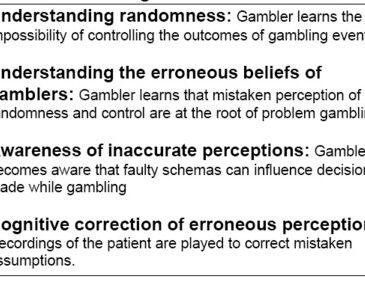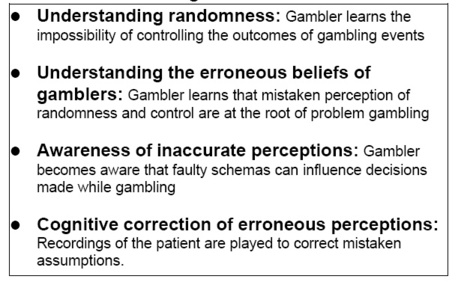For patients suffering from disorders ranging from PTSD to borderline personality disorder, cognitive therapy has been for some time a popular alternative to psychotherapy and psychopharmacology. In its classical formulation, cognitive therapy attempts to modify distorted thoughts (schemas) that underly a pathological symptom. Beck, Rush, Shaw, and Emery (1979) cite the example of a patient who is plagued by feelings of inadequacy. If underlying these feelings is the assumption that “unless I do everything perfectly, I’m a failure,” then cognitive therapy would take steps to change this schema.* Cognitive therapy should not be confused with cognitive-behavioral therapy (CBT); the latter adds another treatment paradigm.
Ladouceur, Sylvain, Letarte, Giroux and Jacques (1998) applied the methods of cognitive therapy to pathological gambling.** The authors propose that the erroneous schema of the compulsive gambler is the mistaken belief of control over game outcomes. Faced with considerable odds, the rational person might make the economically rational decision to refrain from gambling. The pathological gambler, however, will base his or her decision not on rationality but on the mistaken belief in the ability to beat substantial odds. Participants in the study were five pathological gamblers who met both DSM-IV and SOGS criteria. At the start of the study, subjects rated both their ability to control their gambling behavior and their desire to gamble. Cognitive therapy was administered by two psychologists for a maximum of 20 hours. The primary components of the treatment are presented in the Figure.
During the treatment period, four of the five subjects experienced an increase in their perceived control over gambling. The same four subjects found that their desire to gamble concurrently decreased. These changes were maintained even at the six-month follow-up. At the conclusion of treatment, each of the four participants who had experienced favorable attitude changes no longer met DSM-IV criteria for pathological gambling. Of course, a sample of five is insufficient to prove the efficacy of cognitive therapy for disordered gambling. And, it is possible that not all pathological gambling is premised on mistaken perception and faulty schemas. But the results of the present study are promising, and may provide hope for persons seeking alternatives to psychopharmacology and psychotherapy.
Sources:
* Beck, A.T., Rush, A.J., Shaw, B.F., & Emery, G. (1979). Cognitive therapy of depression. New York: The Guilford Press.
** Ladouceur, R., Sylvain, C., Letarte, H., Giroux, I., & Jacques, C. (1998). Cognitive treatment of pathological gambling. Behaviour Research and Therapy, 36, 1111-1119.
This public education project is funded, in part, by The Andrews Foundation and the National Center for Responsible Gaming. For more information contact the Massachusetts Council on Compulsive Gambling.





